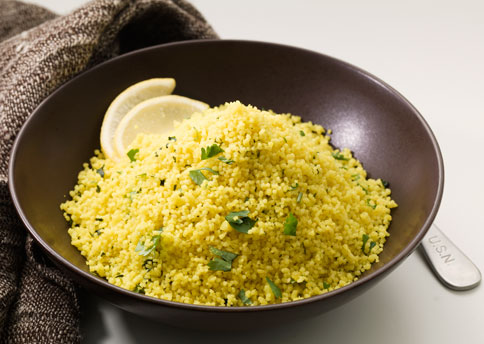With a Northern African origin, couscous is a popular food, which has small balls of semolina flour or durum wheat. Its natural form is usually available online in North African countries and the Mediterranean region. It is available in prepared or pre-steamed varieties in the U.S., Britain, and other parts of the world. You need some hot water to fluff up thee dried couscous balls. It is an increasingly popular food choice in many parts of the world, but is it good? Let's find out now.
Is Couscous Good for You?

The simple answer is yes. If you consume a cup of cooked Moroccan couscous, you will get 36g of carbs, 176 calories, 6g of protein, and 2g of fiber. What makes it beneficial for your health is the fact that it is fat-free and contains no sugar as well. At the same time, it provides you with about 66% of your recommended daily intake of selenium.
Whole-wheat couscous is even more beneficial for your health because it is made from whole-wheat durum flour and has about 6g of fiber per serving, which is enough to meet your recommended daily intake of fiber. It has a mild flavors, so it goes well with most recipes and different flavors, both sweet and savory.
Note
Is couscous good for you? Overall, it is. However, you also need to know that it does not have the variety of nutrients you usually find in true whole grains like brown rice, farro, amaranth, and bulgur. It means you will not get enough nutrients if you eat couscous more often than whole grains. You should definitely include couscous in your diet plan, but you need to ensure that you do not take it as a substitute to true whole grains. Including different varieties of grains in your diet will provide you with all essential nutrients and improve your overall health.
Health Benefits of Couscous
Now that you know the answer to your question, "Is couscous good for you?" you may be wondering exactly what sorts of benefits you get from it. Here is what you need to know.
1. It's Rich in Protein
Couscous is a great source of lean, vegetarian protein. You get about 6g of protein from a cup of cooked couscous. Dietary protein promotes healthy skin, organs, muscles, and other body tissues. Protein is also an integral part of wound healing process. It plays a role in the metabolism of enzymes that aid in wound healing, internally and externally.
2. It Provides You with Dietary Fiber
You get about 2g of dietary fiber from 1-cup serving of couscous. This indigestible carb plays a big role in maintaining your health. It absorbs water in your digestive tract and helps you feel full. This prevents hunger pangs and makes it easier to achieve your weight loss goals. Fiber also limits the secretion of the hormone called ghrelin, which produces feelings of hunger. This keeps you from overeating.It also bulk up your stool and prevents constipation. Your cholesterol levels may come down as well because fiber binds to cholesterol and takes it out of your body.
3. It's Packed with Essential Vitamins
Eating whole grain foods is always a better idea than choosing refined grains. Whole grain foods are rich in minerals, vitamins, and fiber. Couscous is a whole-grain food and is an outstanding source of B-vitamin and fiber. It provides you with niacin, thiamin, B6, riboflavin, and pantothenic acid as well. These nutrients help maintain healthy red blood cells and metabolize energy as well. They also keep your blood, skin, brain, heart, nervous system, and immune system healthy.
4. It Provides You with Trace Minerals
Couscous is also a good source of trace minerals. You get about 61% of your recommended daily intake of selenium from a serving of the pasta. Selenium is vital for your reproductive health, protein synthesis, metabolism of thyroid hormones, and preventing damage from free radicals. Selenium works as a powerful antioxidant and helps reduce buildup of LDL cholesterol and plague in the blood vessels. A cup of couscous also provides you with about 7% off your daily value of manganese, which helps maintain the health of blood, bones, nerves, hormones, and brain. It also helps regulate blood sugar and metabolism.
5. It Contains Potassium
Is couscous good for you? Yes, it is, and the presence of potassium is one of the reasons why you should include it in your diet. Potassium is important for reducing the contract of blood vessels – it has vasodilating effect on your blood vessels and makes circulation easier. It reduces your risk for different cardiovascular diseases. Potassium also plays a role in regulating your blood pressure and prevents hypertension, heart arrhythmias, and other irregularities in the cycle of the heart.
More than 90% of your body consists of water, so the fluid balance in your body cavities and organ systems is of immense importance. This is when potassium helps regulate fluid and cellular pathways. It also regulates the excretory activities of the body and helps get rid of toxins from the body.
6. It's Low in Calories
Another reason to include couscous in your diet is that it has a low caloric content. Couscous is filling, relatively easy to prepare, and is fairly low in calories. You will get less than 200 calories from a cup of couscous, which makes it an even better choice than other grains like quinoa or rice. It also provides you with protein, which promotes muscle development and accelerate fat burning mechanism of your body. It is a perfect addition to your weight loss diet not just because it is low in calories, but also because it is low in cholesterol, sodium, and saturated fat.
